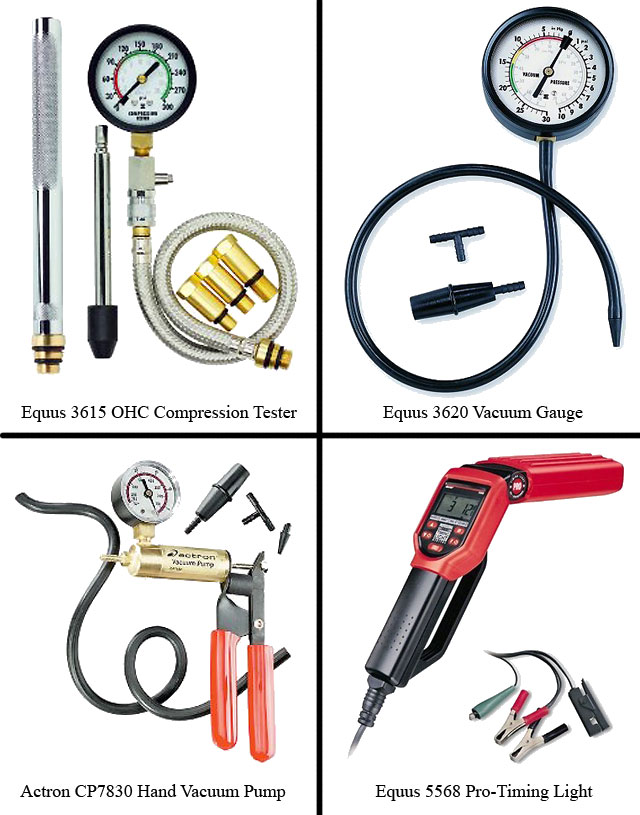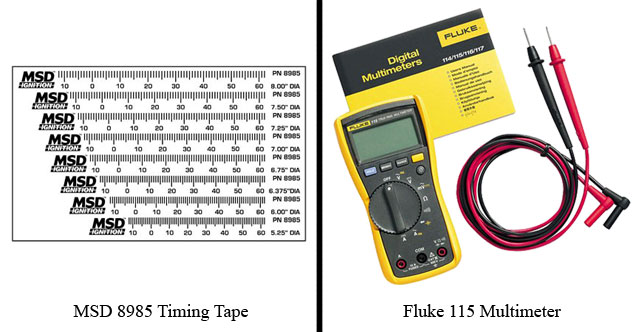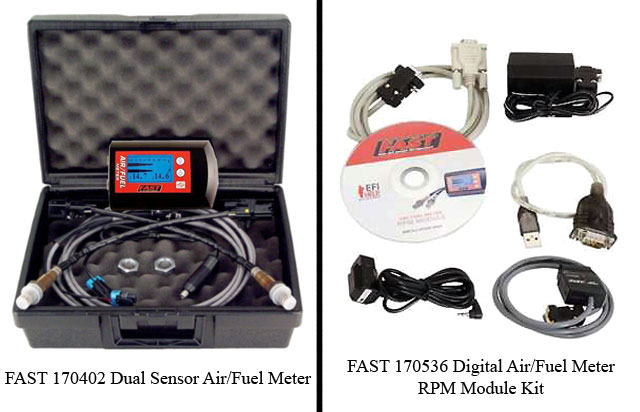Tools, tools, tools, some say you canít have too many
But some times thereís no workaround for not having one (smile)
I just bought some new tools, not that the old ones no longer worked but Iíve had them since 1970 and I was looking for some that where more universal and simpler to use or maybe better words updated with added features. Iím not one to recommend a particular brand or manufacture in tools but I think the ones below will meet my requirements.
Compression Tester ---- All the tuning that you can do is not going to make an engine run great if the engine is not in good condition. Even a brand new engine can have problems that need to be address before you start tuning. On a new engine I would do a compression test after breaking it in for about 500 miles. This break in time I just set the timing to 5 Ė 10 degrees BTDC and adjust the carb to idle fair. This is not the time for wide open throttle (WOT) acceleration runs but thereís plenty of information that can be gathered during this time. The primary thing that Iím looking for in a compression test is that each cylinder is doing its part, the high and low cylinder should be within 30 -35 PSI of each other. Thereís way too many problems that can be uncovered by a compression test to list hear and they need to be addressed before you start tuning.
Vacuum Gauge ---- Thereís no way that you can do tuning with out one. So many things are based/controlled by vacuum and you need a gauge to determine if there working at the right time and optimizing them. Plus itís a good tool to diagnose problems with the basic engine condition. I prefer a large (3 inch diameter) one to use because itís easy to read plus one that works as a vacuum and pressure gauge. The pressure gauge side for checking/setting fuel pressure at the carb. I prefer to have a tach and vacuum gauge permanently install in the truck cab, but you can get by with additional vacuum hose and a vacuum gauge temporarily installed in the cab during the tuning. You need it hooked up to fulltime vacuum on the engine. Its easy to identify a full time vacuum port, if you plug the vacuum hose on a port and it has vacuum at idle itís a full time vacuum port if no vacuum itís a timed port. If you canít find an open port on the carb or manifold you will need to tee off a full time vacuum hose. You can find all different size vacuum tees and caps down at your parts store, I prefer staying away from teeing off the PCV valve port or hose.
Hand Vacuum Pump ---- Iíve had trouble with plastic vacuum pumps in the past, they seem to last a few years then start leaking and not holding vacuum. Even after cleaning, lubing seals and tightening fittings they still leak, maybe it has something to do with going from hot to cold weather. Iím going to try this metal one out. A vacuum pump is good for checking that the distributor can is working right and setting the right vacuum operation of the can. Plus you can use it for vacuum bleeding the brakes with some special cups or checking out vacuum switches and valves used on other areas of the cars and trucks.
Timing Light ---- This timing light has mutable functions. It can advance or retard the timing mark in degrees, RPM reading, battery voltage, charging voltage and checking dwell. If your timing light does not have the additional functions you will also need a RPM meter and a dwell meter if youíre working with points. To advance or retard the timing mark is a nice thing to have but not necessary you can use a timing tape on the harmonic damper. One problem you might run into with a timing light is erratic readings or no readings due to EMI/RFI (Electro-Magnetic Interference/Radio Frequency Interference) interference from the spark plug wires if there (solid core wires, racing wires, or off-road wires) along with some aftermarket ignition systems. The solution might be as simple as temporarily install a street spark plug wire on number one cylinder or you might have to contact the aftermarket ignition manufacture to see what they recommend. I personally have not run into this problem with any hi-performance street ignitions that Iíve used.

Some other things you might need or are nice to have.
Timing Tape ---- If your timing light does not have the ability to advance or retard the timing mark in degrees youíre going to need some timing tape. The timing tape is based on the diameter of your damper and there are a few different diameter dampers out there so you need to measure what you have. You can usually find one at a performance shop or JEGS/ Summit, a nice one is the timing tape by MSD and it covers a number of different damper diameter sizes. Your damper might have the degrees marked on it, if you can read them with a timing light you donít need the timing tape, the number of degrees that you might find on your timing tab is not enough to take all the readings that are necessary.
Multimeter ---- Is nice to have any time youíre dealing with electrical items for trouble shooting any problems as to why itís not working. The one I use is a fluke model 115 but itís probably more expensive one than is necessary for working on cars and trucks. If you need a RPM/Dwell meter I would be looking for an Automotive Multimeter that includes a RPM and dwell function as well as all the standard multimeter functions.

Air/Fuel Meter ---- Not that you would find it in most home/garages, it falls within the status of a luxury and not falling in the category of a must need to fine tune your car or truck. There are plenty of articles/write-ups out there in tuning and itís been for a long time without an air/fuel meter and thereís plenty of good information. Performance street tuning has always had problems, when you make an adjustment/change to one system it might have an effect on another or how it performs on the street and cause a problem. Iíve found through the years that when things just didnít seem to be working right, I fall back on my basic understanding of what it should be and how do I measure it. Iíve tried some other air/fuel meters (home/garage units) in the past and not found a lot of benefit to me in using them, mainly because they where not very accurate and would give false readings. All I can say about this air/fuel meter system at this time is Iím going to give it a try and see if it will be accurate enough and a benefit.

The next section will deal with some more basic system operation. I know (yuck) a lot of people just want to set the timing and fiddle with the idle adjustment screws a little and go out and hit the road. This sometimes works but most of the times not, where looking to optimizing every thing and ignoring some of the basics can cause problems down the road.
Enjoy Your Build